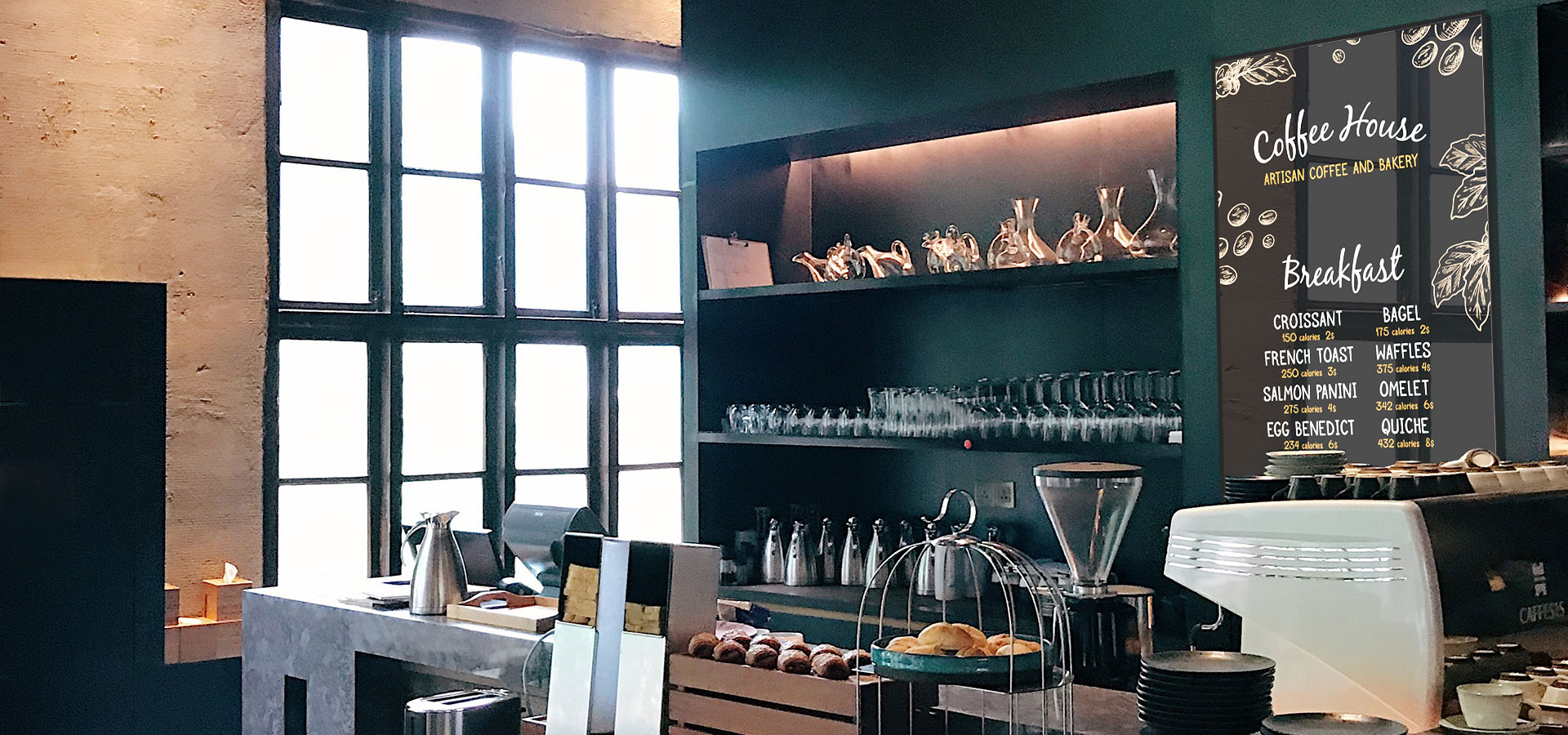When you think of digital signage, the first thing that pops up in your mind might be “those screens at the train station”, or “those screens in that fast-food restaurant". This would be correct, but that is just scraping the surface of what digital signage has to offer.
If you believe that digital signage is only accessible to large corporations and franchises, that is no longer the case. In fact, even the local burger shop can afford to use digital signage in 2021. In this article, we will take you through how you can create digital menu boards for displays to increase revenue and sales.
For most food and HoReCa companies, the display of menus or products can be the deciding factor on whether a customer decides to visit your establishment. Your signage informs your customers about the products your company has to offer and communicates essential information such as pricing and company branding or personality.
These factors are key when it comes to the customer decision process. Studies actually show that nearly half of people (49%) deem the menu to be the most important factor when choosing a restaurant. Prospective customers use menus to judge the quality, appeal, and value of your business, making them a crucial element when it comes to driving sales.
The emergence of digital signage has allowed many businesses to revolutionize the way their offers are displayed. Updating in-store advertisements and signage is no longer a case of changing multiple printed billboards and posters at several different locations. Instead, changes can be made remotely with innovative digital screen publishing tools that instantly publish content across multiple displays.
Creating effective digital menu boards
1. Use design to your advantage
Design is an important factor when it comes to the success of your digital signage. Without a clear strategy both in terms of branding and communication, the digital displays could end up working against your company rather than for you.
Digital signage is a dynamic and fast-paced medium, but it is only as effective as the content you choose to display. A strong design and a compelling message are important elements to grab your audience’s attention, but you do not have to be a graphic designer or professional copywriter to create great content!
A few important things to keep in mind when designing content for your digital signage are;
- Use simple design
- Thoughtful design placement
- Clear communication in terms of pricing and items
With these basic, but important principles in place, your digital signage will ensure that your brand and message are correctly communicated. This will ultimately provide your customers with a better understanding of your offerings and thus make the customer experience a positive one.
2. Schedule content based on time and weather
Digital signage gives your business the flexibility to automatically schedule time-triggers for the products displayed on your menu boards. For example, businesses can automate when to display certain items depending on the time of days, such as breakfast, lunch, or dinner.
This removes the burden of repeating “sorry, we don’t serve X after 10:30 am” to disappointed customers and reduces the hassle of having to replace printed posters.
Additionally, time-triggers can be used to display promotional offers whenever your business sees fit, whether on a 30-second cycle or an hourly basis. This allows you to create a promotional cycle that is bespoke to your store, and optimizing your digital signage specific to your customers or location, can lead to increased engagement and ultimately sales.
Digital menu boards can automatically be updated in conjunction with special offer periods, and only display certain products or deals when they are relevant. This allows businesses to have greater contextual power over what they display and adapt their menus to show only the most relevant products.
Convenience stores can automatically promote hot beverages on a chilly day or ice cream on sunny days using digital screen publishing.
In comparison, printed signage would take significantly longer to change and apply across multiple locations.
3. Use smart placements to drive sales
The placement of your digital signage is crucial to its success, and digital displays can be positioned in specific ‘sweet spots’ where customers are more likely to notice it.
Businesses can conduct surveys to learn more about their customers’ behavior and pinpoint the areas of their premises where customers are more likely to make a purchase.
Effective digital signage that displays special offers can then be placed in these areas to increase awareness and grab the attention of your target audience.
For example, the convenience store franchise, MIX, experienced an increased number of customer walk-ins enquiring about specific products and special offers after installing digital signage outside their store. Similarly, if your restaurant displays a digital menu outside, it is likely the bright imagery will attract attention and influence dining decision-making.
4. Increase sustainability
Sustainability might not be the first thought that comes to mind when thinking of digital signage. You might think the opposite is true. However, digital signage is generally more sustainable than using printed posters as you reduce the need for paper and print. Furthermore, you can reduce food waste.
When items are about to expire, you can promote special offerings to drive up sales of these items. You can even sell them at a discounted price should you wish to do so. This allows your establishment to become more sustainable by reducing food waste. By reducing food waste, you will also see a positive effect on your bottom line. It really is a win-win situation.
5. Benefit from integrations
With the power of integrations, comes great responsibility. Most software vendors have made it possible to do third-party integrations, such as integrating LinkedIn with your CRM system. The same goes for digital signage. Many software vendors have now opened their API to integrations such as Adobe, Microsoft PowerPoint, SharePoint, and social media platforms.
Publish your page on TripAdvisor for live display on your digital displays to show prospective customers the latest reviews. Share your social media feed to entice customers with your latest images. Share customers’ images on your Instagram and display them live for the world to see. The possibilities really are endless.
Conclusion
With a digital signage tool such as DatabeatOMNI, you can design and create digital menu boards with just a few clicks. You can publish content right away or schedule it for a later date, reducing the need for manual labor and ultimately reduce your costs while increasing your sales.
Digital menu boards not only offer high levels of customization, but they also are a great way of promoting your special offers on bright, visible, and eye-catching displays. If you'd like to learn more, feel free to download our free e-book today.







.png)